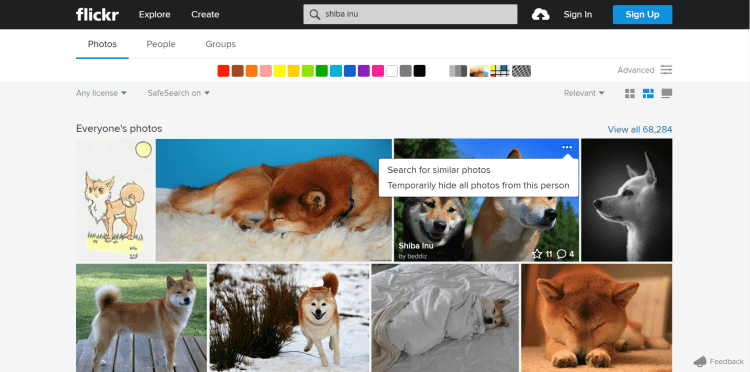Yahoo today is announcing the launch of a new feature in Flickr: the ability to search for images that are visually similar to a single given image. Running one of these searches is as simple as hovering over an image you’re interested in within search results, clicking on the three dots, and selecting “search for similar photos.”
Rather than simply showing images containing the exact same object, Flickr’s visually similar image search — internally called the “similarity pivot” — fetches photos that have certain definite connections, whether they be shape, color, or general categories.
Pinterest’s Lens feature does something like that when it finds pins that are visually similar to what people take pictures of with their smartphone cameras. But Flickr’s data set is fundamentally different; it’s typically user-generated content as opposed to curated collections of product photography and other professional content. So it doesn’t overlap. At the same time, it’s connected because Flickr’s new feature, like Pinterest’s, provides a different way to showcase available content for users.

Above: Flickr’s “similarity pivot” search.
“The similarity pivot is a significant addition to the Flickr experience because it offers our community an entirely new way to explore and discover the billions of incredible photos and millions of incredible photographers on Flickr. It allows people to look for images of a particular style, it gives people a view into universal behaviors, and even when it ‘messes up,’ it can force people to look at the unexpected commonalities and oddities of our visual world with a fresh perspective,” Yahoo software engineer Clayton Mellina wrote in a Tumblr post.
June 5th: The AI Audit in NYC
Join us next week in NYC to engage with top executive leaders, delving into strategies for auditing AI models to ensure fairness, optimal performance, and ethical compliance across diverse organizations. Secure your attendance for this exclusive invite-only event.
This isn’t the first time Yahoo has enhanced Flickr with deep learning, a type of artificial intelligence that involves training artificial neural networks on data and then getting them to make inferences about new data. For one thing, Yahoo uses it to determine if images are not safe for work (NSFW).
Other web companies have been incorporating deep learning into their services, too. Facebook has sought to automatically generate image captions for screen readers so that blind users can understand what’s happening in their friends’ posts, and Microsoft has been working on similar technology for Word and PowerPoint. Shutterstock, meanwhile, has sought to help contributors label new photos using deep learning.

